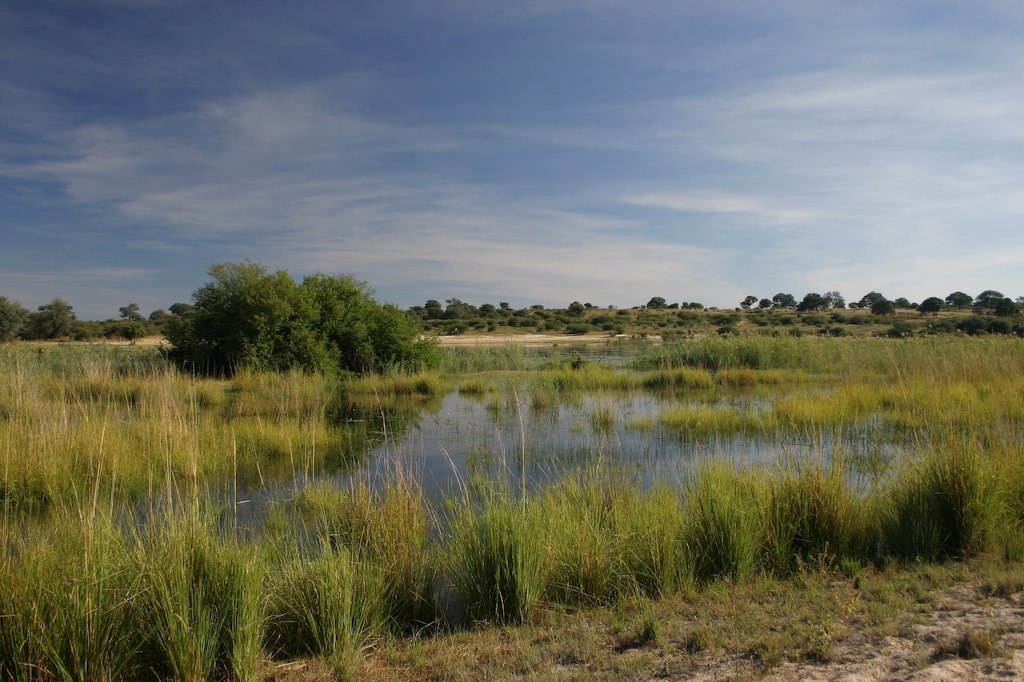
by DGR News Service | Feb 9, 2021 | Biodiversity & Habitat Destruction, Mining & Drilling, The Problem: Civilization, Toxification
Editors note: We are publishing this release because we support all movements against extractive industries. But we want to make clear that bypassing safety precautions is standard for the oil industry and extractive corporations around the planet, and that even when the best available technologies and precautions are used, these things still kill the planet by their very nature. For example, it’s not gas drilling “done irresponsibly” that is the problem. It’s gas drilling as a whole, and by extension the entire industrial economy.
Featured image: Okavango River by Dr. Thomas Wagner, CC BY-SA 3.0 via Wikimedia Commons
Media Release
ReconAfrica fails to place a leack proof lining system in the drilling fluid containment pond. Drill site 6-2 Kavango Namibia
ReconAfrica is a Vancouver based Canadian petroleum exploration company that has acquired an exploration licence for the PEL 73 area located in Kavango East and West in Namibia. Drilling of the first of two permitted exploration boreholes began in December 2020. The borehole, referenced BH 6-2 is situated approximately 600m from the ephemeral river Omatako Omarumba, and all earthworks required to facilitate the drill rig have been completed. This includes a below ground level drill fluid containment pond.
The pond is approximately 45m in length, 30m in width and some 3m in depth and capable of holding almost 4.2million liters of liquid waste It is not known if the capacity of the pond has been designed to contain at least 110% of the largest expected wastewater volume at any given stage as is standard practise. During the drilling process waterbased drilling fluids are used to provide lubrication to the drill bit and to stabilise the borehole amongst other reasons. The drilling fluids are circulated down the borehole and pumped back to the surface for storage in the containment pond.
As drilling progresses the borehole will initially intersect shallow ground water aquifers that typically occur at a depth of 10 to 30m below ground level, At greater depths, at the base of the Kalahari beds and beyond into the underlying Karoo formations, beyond an anticipated depth of about 900m, highly saline groundwater will be intersected. This was revealed in the Environmental Impact Report prepared by Risk Based Solutions. As drill fluids circulate they will bring rock cuttings and a quantity of groundwater back to the surface which is stored in the containment pond built for the purpose. Due to the proposed ultimate borehole depths of 2500m, hypersaline fluid brine will be intersected in the deep Karoo sediments. The return drill fluids that will be placed in the containment pond will therefore contain drilling mud and rock cuttings from the Karoo sediments that are known to contain natural occurring radioactive materials (NORMS), and hypersaline brine – a cocktail that must be treated as hazardous liquid waste.
An onsite visual assessment of the containment pond located adjacent to BH 6-2 has revealed that the containment pond has not been lined with an appropriate water proof barrier system. Although not explicitly stated as a requirement in the Environmental Management Programme prepared by Risk Based Solutions, the requirements for a liner are implied. The report makes it a requirement of ReconAfrica to “…Never allow any hazardous substance to soak into the soil”. Furthermore, the document also requires that upon completion of the drilling, ReconAfrica must “… allow the pollution control dam to evaporate completely, scrape all waste that has collected in the pond and dispose of these and the pond lining at a suitable site”
No lining or efforts to render the containment pond impervious have been made despite the implied requirement that there should be at least a single pond liner. As reported by National Geographic on 29th January 2021 a spokesperson for ReconAfrica indicated in a written reply in October 2020 that potentially toxic drill cuttings from the oil test wells “will be managed in lined pits, cleaned, and disposed of offsite as per company and regulatory requirements.”
Given the vulnerability of groundwater at this site, it would be expected that a double lining system would be required, coupled with monitoring of the pond lining, the interstitial pond fluid (i.e. the fluid between the two liners), the returned wastewater quality for selected parameters such as electrical conductivity (EC) and radioiactivity. Regular monitoring of the groundwater quality in the immediate vicinity of the site must also be implemented.
Management guideline for saline fluids for hydraulic fracturing published by the British Oil and Gas Commission in April 2019 provide detailed requirements for the impoundment of saline flowback such as anticipated in Kavango East and West. Among the many design requirements specified in Canada some include:
The primary synthetic liner must be a minimum of 60 mil (1.5 mm) thick, have hydraulic conductivity of 10-7cm/s or less and must have properties that are fit for the purpose intended and conditions and temperature extremes encountered.
The secondary synthetic liner must be a minimum of 60 mil (1.5 mm) thick, have hydraulic conductivity of 10-7cm/s or less.
The design must incorporate a leak detection system within the engineered seepage pathway leading to at least one leak detection well, vault, or port. This must allow for water sampling from the lowest point of the pond, positioned between the primary and secondary liners and be designed for accurate measurement of leakage rate.
The BC Oil and Gas Commission also provide guidelines for the management of containment ponds which include some of the following actions:
The pond must be constructed and bermed in a manner that does not allow surface runoff from the site to enter the pond. A minimum of 1.0 m freeboard must be maintained within the containment pond at all times. The primary containment liner be regularly inspected for evidence of leaks and damage and that records of issues related to inspections and corrective actions be maintained.
A groundwater monitoring program must be developed by a qualified professional to evaluate potential groundwater impacts that could be associated with the pond. Monitoring wells must be used to establish baseline conditions for groundwater levels and chemistry prior to use of the containment pond and the baseline monitoring. Samples from the leak detection system and sub-drain must be collected and analyzed on a weekly basis.
Visual evidence obtained from the site indicate that ReconAfrica are not in compliance with their own declarations made in October 2020, and do not comply with the requirements of the EMPR. They are therefore in violation of the Environmental Compliance Certificate issue by the Ministry of Environment and Tourism. In addition, ReconAfrica have chosen to ignore Canadian industry approved guidelines issued by the Oil and Gas Commission in British Columbia, the state in which the companies head offices are located.
Despite the fanfare and extensive publicity that ReconAfrica have generated over the drilling of water wells adjacent to each exploration borehole will be made available to the communities once the exploration holes are completed – there will be no benefit accrued if the groundwater is contaminated by drilling effluent. The conclusions and inferences that can be drawn from the cavalier attitude of Recon Africa is that there is a lack of respect for the rural indigenous people of Kavango East and West who’s livelyhoods are total dependent on access to clean groundwater.
END OF RELEASE

by DGR News Service | Feb 7, 2021 | Biodiversity & Habitat Destruction, Listening to the Land, Movement Building & Support
Sage Songs: Or What the Thacker Pass Rabbits Know About Music
by Will Falk
Rabbits taught me that each sagebrush has a unique voice. I often take long walks across the steppes in Thacker Pass. It’s not uncommon to spy a rabbit – with one floppy ear pointed one way and one another – peeking out of the tangles of sagebrush branches.
Today, as I wandered across the basin floor, I asked Thacker Pass aloud if she wanted to talk with me today. As the words were pulled from my mouth by a strong, cold north wind, a rabbit sprang from bushes at my feet, throwing snow up with his strong back legs. I followed his tracks as long as I could until they crossed an exposed patch of dirt where the sun had thinned the powder. I dropped to my hands and knees to study the dirt for the imprint of rabbit feet. The wind blew with a gust.
And, that’s when I heard them.
The sage surrounding me reached towards the sun to let the wind wash through their branches and leaves. I was transfixed by the fragrant melodies formed in the frictions between sage and wind. I do not know for how many measures I knelt there listening to the unmetered chorus sung in keys no human singer can achieve swirling around me.
Eventually, I opened my eyes to find myself looking at the rabbit’s tracks a few yards away. As I crawled along the rabbit’s path, different sections of ensemble rose and fell. I realized that each individual sagebrush with its own specific pattern of leaves, specific orientation to the wind, and specific structure of branches contributed its own sonic hues to the masterpiece.
As I leaned my head towards the heart of the closest sagebrush, the sunshine fell through the clouds and the sagebrush’s twisting limbs. I recognized the sun as the great conductor of this symphony. I saw how the sagebrush grew towards the falling photons while intentionally choosing the specific patterns, orientations, and structures that, with the help of the wind, would create the most enchanting sounds.
It was the most fascinating song I’ve ever heard.
Finally, the wind touched my bones and reminded me that my blood would only remain warm on the exposed steppes for so long. As I rose from my crouch, I spotted the rabbit hiding under an ancient, thickly knotted sagebrush. He made eye contact with me, straightened his ears for a moment, and then settled back into the auditory rapture I had just emerged from.
#protectthackerpass
Image by Max Wilbert
Will Falk is a DGR member, lawyer for the natural world and is currently in direct action to protect Thacker Pass. He has also journeyed in conversation with the Ohio River. You can read about Will’s journey with the Ohio River here.
For more on the issue:

by DGR News Service | Feb 6, 2021 | Culture of Resistance, Movement Building & Support, Strategy & Analysis, The Problem: Civilization
How do we fight? All together. What is resistance? Organized.
Passions, Humour and the Vocabulary of Strife
by Trinity La Fey
“Men understood what it is to be in a war and you gotta’ be armed. Women don’t have that knowledge.” – Phyllis Chesler.
. . .
“But humour, after all, in patriarchy, is just seeing the way things are, you don’t have to try.[…]Meanwhile rape increases out there, the destruction of the environment increases out there, in here, but women are dealing and dealing. And think of the consequence of the therapeutic[. W]hat happens is objectification of the speaker[. I]nstead of real passion, they offer plastic passion.[…]When I feel passion, I feel: Love, for example, Joy, Sorrow, Rage, Hope, Despair. These are passions that are real. I name them, they have an object; they have an agent or a cause, right? You enrage me[. H]e did this and I hate it; I’m enraged at him, at them, etcetera. You can name the agent with real passions. Now, consider the plastic passions of therapy. You know, I see them as floating blobs, sort of bubbles. There’s never any cause out there. If there’s any problem it’s you. You have to deal with it, this blob that’s floating around. For example depression: depression, I suggest, is a man-made passion. I don’t think we have it. I just think[: ‘]Oh, I’m feeling depressed today. You see, I had familia for breakfast and . . . and I just can’t seem to get my shit together.’” – Mary Daly
. . .
Part of being effective in an organization is knowing where you belong in it. What are you good at?
For my part, I cannot say my strength is organizing others, but spectacle and argument in the most political sense. That doesn’t let me off the hook for trying to organize, which I do also, it just means that trajectory is best served by interest and aptitude. Recently, it was pointed out that my interest in male violence and environmental destruction is concerning from the outside. How many hours a week do I spend investigating all the crazy? I didn’t know. Okay, 80 hours+ is an unhealthy lacks balance, maybe I can scale it back. My experience in Policy Debate, was seasoned by a life where argument was an impassioned, often dangerous risk. As far back as I can remember, any serious discussion, of any kind, has been accompanied by a body reaction wherein I shake and weep. It does not impair my ability to listen or argue, but it does happen every time; I know why, it is non-negotiable. My body can be understood and interpreted, but not overridden.
Coming into the tournament practice of three hour debates was something I had stamina for. Success was a direct benefit of being able to ‘spar’ in a way that risked so little as to allow for the development of skill. Now, I know how to be an effective agitator. Which brings me to twitter. Last year was my first to really experience a social-medial platform, largely where public policy and debate have moved. Although it has proven to be a uniquely valuable resource, it was designed to be addictive to its traumatized product: the users. It is enemy territory.
There are specific reasons for entering that are a danger to forget.
It was not a place to move my real friendships into; it was a place to find strangers; it’s a place where the ethos is: fight me. These are sparring partners. From the insulated attempts at consciousness raising done here spring the people we don’t know we deal with every day: who mandate the policy of our lived lives by each interaction. From the ethereal melting pots of YouTube, and now twitter, I found common allies with the natural world and moved those relationships into physical reality. So many organizations awaited, about which I would otherwise have no awareness. Glad is not the right word, but I do not regret the time I have spent there, learning about who we have become.
If debate taught me anything, it’s that the person with the most evidence wins; and here we get to the messy stuff. On what grounds is truth provable if not by the self-evident nature of itself? We try definitions. Sometimes that doesn’t work. Why not? Why does the power of naming need to be as individuated as experience? Does it? What power do I have to name if I am not bothering to brave the conversation with people I don’t agree with, in places I don’t like?
Usually, if I see unironic pronouns in someone’s bio, it doesn’t matter how hilarious their tweet was, I cannot bring myself to follow them. Nowhere on my list of things to do today is getting doxxed by a misogynist; I’m busy. Monika Lewinsky gets a pass, because the thing is, it does matter what happens to our collective minds. Bean Dad doesn’t have a name anymore. His life is different now, because of a collective of people. Someone had retweeted a particularly vile passage saying, “this is psychotic behavior.” I thought, “Oh yeah?” and read all the way down. All the comments. Down to the bottom.
It was impossible to look away because it was a spectacle.
Some childless fathers outed themselves and everyone else – including all the colourful pronoun people and the radical feminists and the right-wing housewives and the left-wing teachers – we all came together and said “no”. It felt good because, psychotic, evil, psychopathic or complicit, we all know what wrong is, but also because the platform is addictive and fighting is a rush. It is an affront to need to fight, to feel a boundary violated (as anger induction has brilliantly been identified). It feels good to make it stop, to make it right, to fight back. To say no.
But it feels better to say yes and mean it. Strife is complex. The complexity is ever compounded by the emergent nature of life and time. What is going on between the living planet and industrial civilization may not be rightly classified as war until effective resistance has been established to fight back. While it closely resembles many things termed ‘war’ in the recent past, it is industrial civilization acting upon: destroying the living planet, while the living planet continues to provide industrial civilization with the capacity to do so. What do we call this? I am not the first to appreciate the parallel here to battery. We are, as Earthlings, wild things, born into enemy territory.
Industrial civilization has changed every landscape.
There has to be some calm, radiant center from which no strife emerges, a source of real Joy, some benevolence in which to thrive for survival to be worth it. Retreat into the ethereal is one psychological strategy, when even the body is colonized. Retreat into identity politics or lifestyle activism or isolated, survivalist enclaves may serve, for those afforded it. Always, always this escape, this endless exploration of colonized frontiers to flee. What if we weren’t afraid to say that we have real, physical enemies that we could defeat? What would that change? Inside such a whirlwind, it can be difficult to negotiate all the feelings alone and impossible to relate, if thoughts and feelings are able to condense enough to crystallize, with so many of the necessary terms made forbidden as negative or even the ignorance with which we all come to new terrain.
Why not start with hate? Who hasn’t heard that the opposite of love isn’t hate, it is indifference? Bullshit. Men don’t make torture porn of appliances. Love has never been required for the avalanche of revulsion and Rage that I understand as the experience of hating someone. They are not a food that just hasn’t grown on me. I don’t merely dislike them. It most often precluded any chance of love. How can I – why should I pretend to anyone that I have not felt this way, that, if so confronted with a gross boundary violation, I should not feel this way? What does it mean when someone hates back? Is it speak-able? Is it different somehow? How? I think about what it has taken for me to be able to say, “fight me,” and not mean ‘I hate you’: for disagreement to be a reason to engage, rather than refuse to listen or share, to neither presume to be the final arbiter of reality, nor assume bad faith, but to risk a little; or, to say, “hate me,” and mean it: to be able to withstand someone. Practice helps.
Better yet, Rage.
I think the reason Rage is so vilified is that, like Fear, it is no longer a personal experience, but a collective, spiritual, chemical one. The Fear. The Rage. Possessions of a sort: coming from somewhere, there for a reason and eventually something else’s food. When I feel Rage, I feel it overtake me. Often, I lose vision, or it darkens and pinpoints. I say things in a loud, clear voice that I do not remember after. I cannot hear the voices of strangers. When it breaks, it is like a disrupted spell. I shake afterwards. Rage has done heroic things through me, but with a steep tax.
Much like Fear, it is not because, in my subconscious, I am my own oppressor and I just need to love myself enough to love others. It is about pain aversion, death aversion; it is because our inner, ancient brain has signaled that there is a legitimate threat it does not find itself capable of matching right off. It is my amygdala saying “get out now”. That is not to suggest these states are incapable of being distorted into paralysis or unjudicious application, or that they are without their own character and momentum.
Rage can be blind, and has done less than heroic things through me.
Having an enemy is a hard thing to admit when the stronger urge is to give as the Earth does, to love as mothers do, but that doesn’t stop them from existing. Mothers know what to do when their children are threatened. The Earth becomes less generous daily. Having an enemy does change you; it draws out characteristics capable of matching the things our amygdala tells us are scary. That biology developed to address periodic threats, but not to run all day every day; we are supposed to change back. To resist, to truly stand our ground, we must know where we are. Not who we think, but what is functional, where we physically are. That is in our bodies, as part of the land. That is the territory from which we can no longer afford to retreat. Our visions of ourselves will change as arguments move through us. Truth, the singular, is something we will catch glimpses of and try to piece together. Doing that as a collective is language.
We cannot be punished out of or persuaded into what we observe. We can only listen as we are able and share with those who’ll listen. Conversationally. Physically, to resist takes good health: strength, endurance and flexibility. Fighting is a tough one. Having been in fights, I don’t get ideological about this. Being in a fight is a physical experience, different than sparring, horsing around, different from heated discourse. Once in a fight, verbal or physical, it’s almost got its own world. Inter-dimensionality makes so much sense in fights. Everything is distorted, sharp and slow. Waves of fight wash in an ebb, leaving tired, heaving creatures who want to slink off and lick wounds but aren’t sure if it’s done yet. It is very important to pick your enemies and your battles. I say this because I need to hear it. Who is really prepared to have a conversation about something, and who is a drone? Who is a dangerous drone: know when to walk away; know when to run. Practice helps, but practice sucks and is expensive.
When I think about The Sorrow of war, and of warriors, I do not pathologize it.
Sorrow is not a sickness or a pastime of the feeble. Sorrow is the reasonable expression of experiencing loss and pain. To be forbidden the experience of our own grieving stifles our health and ability to heal. You feel your own real feelings all day. I say to me. Being emotionally resilient cannot mean repression, which only putrefies whatever is being buried, but a capacity to be uncomfortable, to reflect and change.
In the service of making Sorrow an illness, the language of ‘internalization versus externalization’ and of ‘self-esteem’ or ‘self-loathing’ has emerged to replace the terms ‘oppressed versus oppressor’ and ‘trust in others to listen’ or ‘desire to cease pain’. Fuck ‘em. Do you. Healing requires a nurturing environment, with the cause of harm removed, wherein you are not forced to react to villainy. That is not universally afforded to everyone. To whatever extent you can, balance between the work against and the work for. That ‘for’ is you too: your Joy, your Love, which all dies with you, or before, if it is not nurtured, lived and shared. Once hurt, healing takes time and can hurt more than the injury. Take your time. Feel your pain. Heal. Remember.
When The Bards used satire, they deposed kings.
They would only ever use satire for this reason and only when absolutely necessary. What kind of power is that? The remaining shadow of this tradition, in lore, is the Jester: the only court member who can get away with telling the truth. What kind of power is it when the king doesn’t get your jokes, but the rest of the court does and they do nothing? When Machiavelli wrote The Prince, he did it as a work of satire. Today his name is synonymous with authoritarianism as a ruling strategy. What power is it when no one gets your jokes? Theory is important, but action more so. As our actions are stifled, so our thoughts about potential actions. How to get free? Together. While spectacle might hold attention, only collaborative, permeable theory has the strength to make action inevitable, even desirable by far over the alternative: that we will continue to degenerate into increasingly stratified cybernetic zombies until we drive to extinction every last Earthly biome. What power?
Unfortunately, the sociopathic and necrophilic are better at war; unclouded and unbothered by the ramifications, those traits are designed to win wars. Clinical psychopathy was previously thought to be rare. Now, the very structure of modernity demands sociopathy as a baseline business model while the vast, common traumas of peoples’ personal lives are made unspeakable and left to fester. That is a recipe for a populace physically incapable of empathy on a massive scale.
So, back to being part of something worthwhile:
can there be legitimate honour in some twitter feeding frenzy? Where does honorable conduct live? What does empathy feel like when the person across from you has none? Are they an enemy? How to keep from catching? How to know? Without the capacity to feel shame: to know when we have done wrong, used The Rage unjudiciously, been paralyzed when we should have acted, or nursed an addiction, we would have no sense of our accomplishments. Workaholism has not delivered The Joy of accomplishment like pornography does not deliver The Joy of relationships. Maybe integrity is not something we are born with or into, but something slowly earned by learning to recognize its absence. Without the capacity to feel that vacuum, we wouldn’t have sought.
Joy guides. In shared pleasure, laughter, play, in being among beloved, I learn the codes of social conduct from people who can say, “fight me,” and mean ‘I love you’. Without the capacity to reflect, in discomfort, we cannot recognize patterns. Bean Dad is not my friend, but he is not my real enemy either. That flash community dispersed and the Earth remains largely undefended.
After switching from Debate, to Drama, then Humour, and then Duo, I tried Poetry.
If the performance arts taught me anything, it’s to know your audience. The judges didn’t care who was right, who had the evidence, whose argument was impenetrable, they wanted you to make them cry, and they wanted to love you. It helped if you made them laugh, but they had to want to see you at finals: you couldn’t bore them. The best way to do that was not universal, but that is, nearly universally, the way people judge.
Gloria Steinham’s work wasn’t popular because she was the best writer in the second wave, but because she was able to infiltrate male exploitation of poor women with her beauty and expose it to the middle class. Andrea Dworkin’s work wasn’t unspeakable. She spoke it; it was unhearable because she shouted it in overalls, with a big mouth and crazy hair. They were the spectacle. Not because they wanted to be, not because they particularly enjoyed the attention, but because they were women. What they had to say barely got through the endless attention given to their appearances. Because they were women: without the spectacle, we wouldn’t have even that much.
Marry Harris Jones wasn’t ‘The Most Dangerous Woman in America,’ at 83 years old, because she organized people, although she did that also, but because she put people to shame.
Her power was in stamina. My power will never be in being a body in the street, although I do that also, but in being one of many, in the sheer amount of evidence collected, in being able to illustrate an argument that can stand for itself, in knowing an audience well enough to make sure that they can hear it, in remembering our place in the Earthly legacy of women this side of the burnings.
My place is to float away alongside them, like ash, when my time comes, to forfeit all my names back into dust and droplets. Until then, I will fight and convalesce and it will mean ‘I love you’.
Trinity La Fey is a smith of many crafts, has been a small business creatrix since 2020; published author; appeared in protests since 2003, poetry performances since 2001; officiated public ceremony since 1999; and participated in theatrical performances since she could get people to sit still in front of her.





